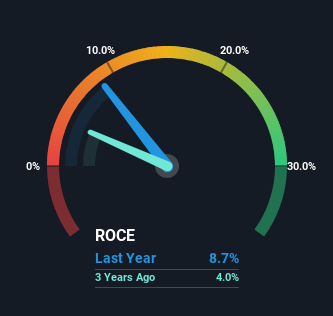Südzucker (ETR:SZU) Shareholders Will Want The ROCE Trajectory To Continue

Finding a business that has the potential to grow substantially is not easy, but it is possible if we look at a few key financial metrics. One common approach is to try and find a company with returns on capital employed (ROCE) that are increasing, in conjunction with a growing amount of capital employed. Basically this means that a company has profitable initiatives that it can continue to reinvest in, which is a trait of a compounding machine. So on that note, Südzucker (ETR:SZU) looks quite promising in regards to its trends of return on capital.
Understanding Return On Capital Employed (ROCE)
For those who don't know, ROCE is a measure of a company's yearly pre-tax profit (its return), relative to the capital employed in the business. To calculate this metric for Südzucker, this is the formula:
Return on Capital Employed = Earnings Before Interest and Tax (EBIT) ÷ (Total Assets - Current Liabilities)
0.087 = €613m ÷ (€8.9b - €1.9b) (Based on the trailing twelve months to August 2024).
Therefore, Südzucker has an ROCE of 8.7%. Ultimately, that's a low return and it under-performs the Food industry average of 13%.
View our latest analysis for Südzucker

In the above chart we have measured Südzucker's prior ROCE against its prior performance, but the future is arguably more important. If you're interested, you can view the analysts predictions in our free analyst report for Südzucker .
What Can We Tell From Südzucker's ROCE Trend?
Shareholders will be relieved that Südzucker has broken into profitability. The company was generating losses five years ago, but has managed to turn it around and as we saw earlier is now earning 8.7%, which is always encouraging. While returns have increased, the amount of capital employed by Südzucker has remained flat over the period. With no noticeable increase in capital employed, it's worth knowing what the company plans on doing going forward in regards to reinvesting and growing the business. After all, a company can only become a long term multi-bagger if it continually reinvests in itself at high rates of return.
Our Take On Südzucker's ROCE
As discussed above, Südzucker appears to be getting more proficient at generating returns since capital employed has remained flat but earnings (before interest and tax) are up. Astute investors may have an opportunity here because the stock has declined 19% in the last five years. With that in mind, we believe the promising trends warrant this stock for further investigation.
One more thing: We've identified 4 warning signs with Südzucker (at least 1 which can't be ignored) , and understanding them would certainly be useful.
If you want to search for solid companies with great earnings, check out this free list of companies with good balance sheets and impressive returns on equity.
New: Manage All Your Stock Portfolios in One Place
We've created the ultimate portfolio companion for stock investors, and it's free.
• Connect an unlimited number of Portfolios and see your total in one currency
• Be alerted to new Warning Signs or Risks via email or mobile
• Track the Fair Value of your stocks
Have feedback on this article? Concerned about the content? Get in touch with us directly. Alternatively, email editorial-team (at) simplywallst.com.
This article by Simply Wall St is general in nature. We provide commentary based on historical data and analyst forecasts only using an unbiased methodology and our articles are not intended to be financial advice. It does not constitute a recommendation to buy or sell any stock, and does not take account of your objectives, or your financial situation. We aim to bring you long-term focused analysis driven by fundamental data. Note that our analysis may not factor in the latest price-sensitive company announcements or qualitative material. Simply Wall St has no position in any stocks mentioned.
About XTRA:SZU
Südzucker
Produces and sells sugar products in Germany, rest of the European Union, the United Kingdom, the United States, and internationally.
Excellent balance sheet and fair value.
Similar Companies
Market Insights
Community Narratives



